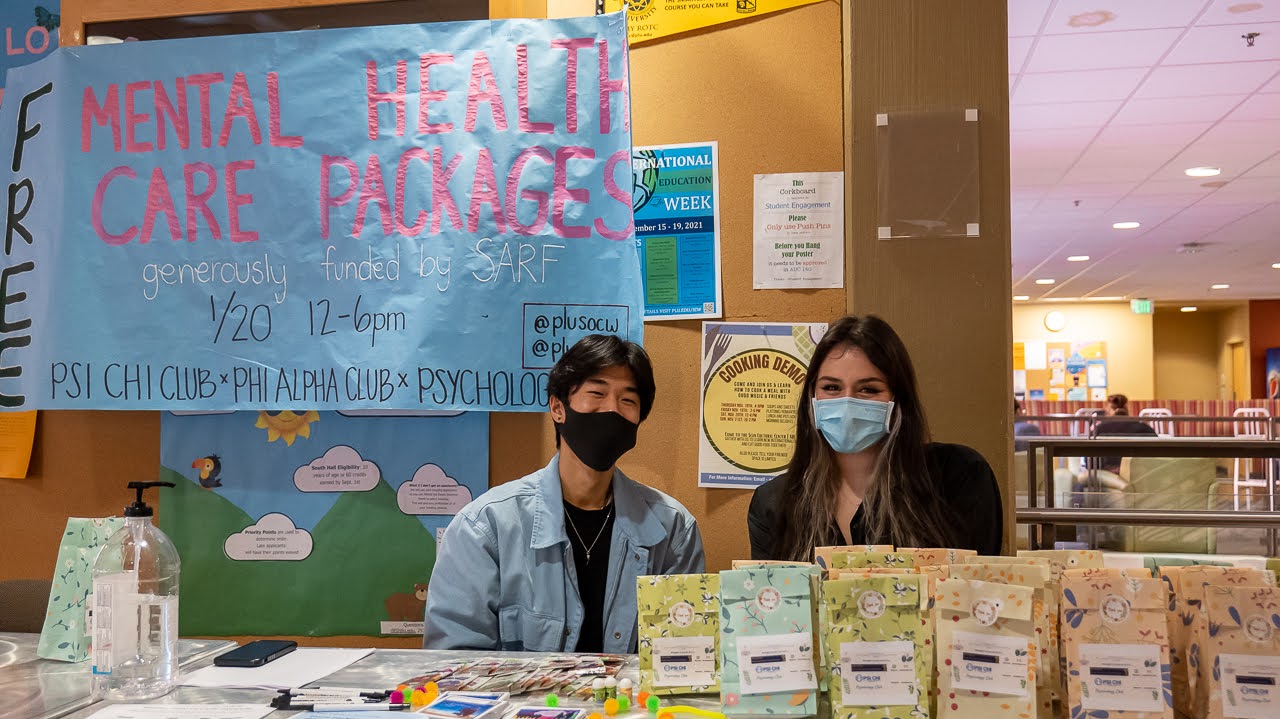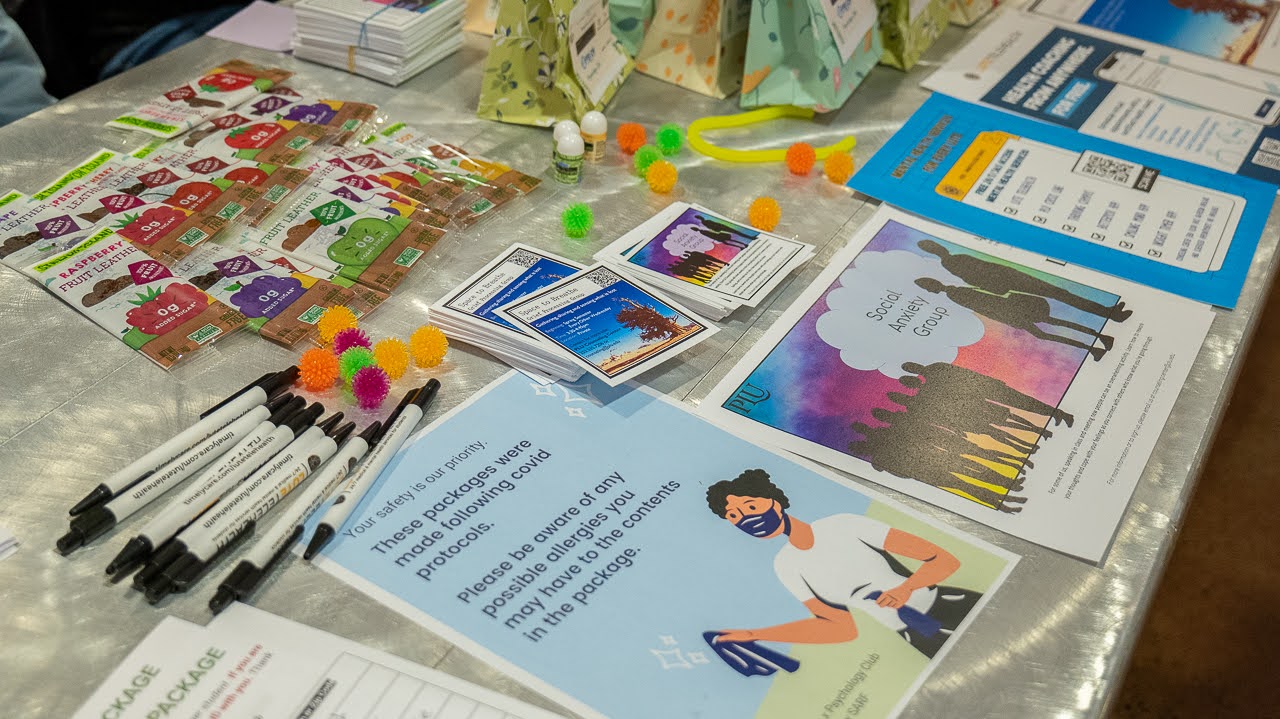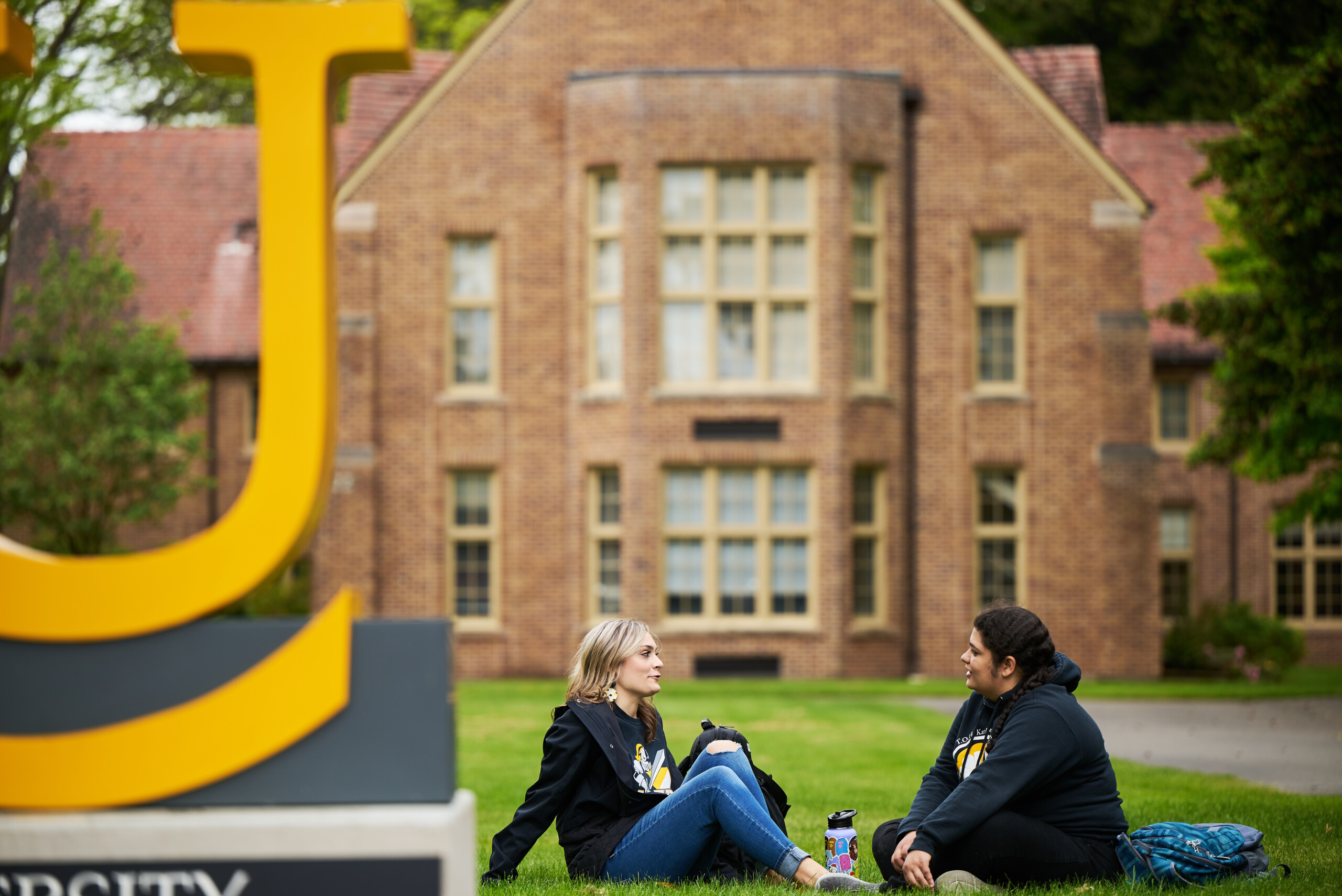How the PLU community is addressing mental health

By Veronica Craker
PLU Marketing and Communications
Walk across campus and you can see the effects of the COVID-19 pandemic everywhere.
Masks on faces, signs reminding you to wash your hands, restrictions on classrooms and more. But the pandemic hasn’t just caused physical changes, but also unexpected mental challenges. And that is harder to identify and address.
In the winter of 2021, a survey was conducted at 102 colleges by the Healthy Minds Network. The survey found 43% of college students reported experiencing depression and 34% reported anxiety. They also found that 30% of undergrads were unsure of where to go on campus to access mental health care.
“There are so many big milestones that we have in life, and going to college — if you choose to do so — is one of them,” says social work major and Phi Alpha Honor Society president Koa Beck ’23. “But when that growth is interrupted by a worldwide pandemic, there’s no real way to adjust to that. It’s been challenging for a lot of people.
“I think that PLU has done a great job of making sure that students know that what they’re going through is not normal and that it’s okay to adjust the way you need to.”
At Pacific Lutheran University, students, staff and faculty are creatively and compassionately leading efforts to ensure resources are available to PLU students who are experiencing mental health issues including stress, anxiety and depression.
A community that cares
When the pandemic hit, the university pivoted quickly to ensure students’ needs were being met, and communication about these services and opportunities became vital for the well-being of the PLU community.
“When (PLU) sends out resources via email, I think it’s really important and it’s reaching certain people, but we feel it may not be reaching everyone,” said Ricky Haneda ’22, a psychology major and Psychology Honors Club president.
In an effort to streamline this messaging and provide clarity to the student body, a group of PLU students — representing the Phi Alpha Honor Society in Social Work, Psi Chi Honor Society in Psychology, and the Psychology Club — put their heads together to come up with a way to get these resources into the hands of those who need it.
“The majority of my college experience has been online,” said Beck. “We looked at the outcomes of (the pandemic) and the effects it has had on our mental health and thought, ‘how can we reach students in a way that faculty maybe can’t?’ As fellow students, we thought the best way to reach them was through us.”
A student leadership group that consisted of Beck, Haneda, Jade Vanags ’23, Kelsey Turner ’23, Tahra Menon ’23, and Ariana Schieber ’22 worked to put together care packages filled with mental health resources.
“This has been a challenging year for PLU students,” said Vanags, psychology major and Psychology Club president. “We wanted to provide students with accessible, valuable resources that we could see a purpose to as students ourselves. Everything we selected to place in our care packages was intentional and resourceful.”
To obtain funding for the care packages the students applied for a grant through the Student Activities and Resource Fee (SARF) committee.“Essentially how the SARF funding worked was for us to come up with a very concrete proposal for helping students,” said Haneda. “We brainstormed a bunch of ideas on what to put in the package. I think the most important thing was the list of both on and off-campus resources—including the PLU resources and health center and counseling center information.”
SARF approved the proposal granting $1,055 toward the project. This allowed club members to purchase the items for their care packages, consisting of fidget toys, lip balms, face masks, and snacks.
“PLU has excellent mental health resources that we feel are underutilized,” said Vanags. “It is an incredibly daunting prospect to advocate for one’s mental health and seek out help when you need it.”

Striving for transformative care
Mental health care has long been a topic of importance at PLU, even before the COVID-19 pandemic. PLU was one of the first universities to adopt telehealth and virtual services with Lute Telehealth in early 2020. The program helps PLU meet its diversity, equity and inclusion priorities by ensuring students have access to providers–mental health and health–who share their identities and by ensuring that mental health resources are available to students at any time whether they are on campus or in another location.
“Part of bringing on telehealth was to create necessary flexibility in staffing,” said Joanna Royce-Davis, PLU’s Vice President for Student Life. “That allowed us to acquire specializations that might not have been within our current scope, but more importantly to expand the range of providers available to our students.”
In addition to these services, staff in PLU’s Division of Student Life are working to increase services and provide more inclusive wellness and care. In fall 2021, PLU partnered with ThrivingCampus, a college-focused referral resource that links students with providers who may specialize in services that are outside of the university’s scope and, like Lute Telehealth, may assist students to engage providers who share identities and experiences with them. In a few cases, the turnaround for matching students to resources and the next available appointment was happening within six hours, much faster than it would occur in a community setting otherwise, Royce-Davis says.
It isn’t just the on-campus PLU community finding ways to support students, the local community, alumni and donors have also stepped up. On Giving Tuesday, an annual one-day fundraiser in November, the PLU community raised more than $40,000 for a new clinical care coordinator and crisis counselor.
Royce-Davis says the clinical care coordinator likely will have a background in social work with a clear understanding of community resources related to meeting basic needs both at the university and beyond. They will also be licensed with a mental health background so they are able to provide some direct services for students.
“The vision is to continue to think very purposefully about points of access and availability of resources that respond to students’ evolving needs, but that are really embedded well into community as part of an intentional well-being ecology and that are flexible enough for us to continue to walk with students in their wellbeing experiences as those may change,” said Royce-Davis.
Making a connection
After months of planning, the student organizers were finally ready to hand out their care packages inside the Anderson University Center on January 20th. For six hours they sat at a table outside the Old Main Market and handed out 245 care packages. Among the 245, they reached students from every resident hall on campus, off-campus students, and staff. Haneda says the response was overwhelmingly positive with many expressing gratitude for the care packages.
“I think it’s important that people know that they’re not alone,” says Beck. “That sounds cliche, but it’s so true. I feel like a lot of people are still living in isolation because that’s what they’re used to and that’s what they’ve been accustomed to. I’m hoping that through our care packages and through all the work the university is doing, they’re able to see that they have a community here and that people care about them.”




Social Media